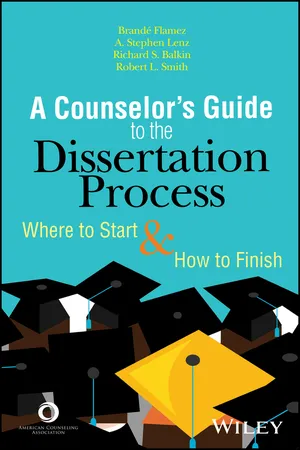
A Counselor's Guide to the Dissertation Process
Where to Start and How to Finish
- English
- ePUB (mobile friendly)
- Available on iOS & Android
A Counselor's Guide to the Dissertation Process
Where to Start and How to Finish
About this book
This engaging book not only offers step-by-step guidance on planning, writing, and defending a dissertation but also helps create a beginning-to-end process that is meaningful, rewarding, and exciting. Each chapter answers commonly asked questions, contains a checklist for each part of the dissertation, provides a summary of key points, and lists additional resources. Topics addressed include tips for staying motivated, time management, and self-care; selecting a dissertation committee and narrowing down the topic; writing a proposal; preparing the literature review; creating the problem statement, purpose statement, and research questions; understanding research methodology and ethics; collecting and analyzing data; presenting results; and best of all—publishing a dissertation.
*Requests for digital versions from the ACA can be found on www.wiley.com
*To request print copies, please visit the ACA website https://imis.counseling.org/store/
*Reproduction requests for material from books published by ACA should be directed [email protected]
Frequently asked questions
- Essential is ideal for learners and professionals who enjoy exploring a wide range of subjects. Access the Essential Library with 800,000+ trusted titles and best-sellers across business, personal growth, and the humanities. Includes unlimited reading time and Standard Read Aloud voice.
- Complete: Perfect for advanced learners and researchers needing full, unrestricted access. Unlock 1.4M+ books across hundreds of subjects, including academic and specialized titles. The Complete Plan also includes advanced features like Premium Read Aloud and Research Assistant.
Please note we cannot support devices running on iOS 13 and Android 7 or earlier. Learn more about using the app.
Information
Chapter 1
The Doctoral Dissertation

What Makes a Dissertation So Difficult?
Intellectual and Emotional Challenges
Writer's Block
How is a PhD in CES Unique From Other PhD Degrees?
Table of contents
- Cover
- Title Page
- Copyright
- Dedication
- Preface
- Acknowledgments
- About the Authors
- Chapter 1: The Doctoral Dissertation
- Chapter 2: Staying Well Throughout the Dissertation Process
- Appendix A: Example of a Student Wellness Plan
- Chapter 3: Selecting the Dissertation Committee and Narrowing Down the Topic
- Chapter 4: Writing a Proposal
- Appendix B: Example Quantitative Proposal
- Appendix C: Example Qualitative Proposal
- Chapter 5: The Literature Review
- Appendix D: Example of a Literature Review Outline
- Chapter 6: Creating the Problem Statement, Purpose Statement, and Research Questions
- Chapter 7: Research Methodology and Ethics
- Appendix E: Subject Informed Consent
- Appendix F: Subject Assent
- Chapter 8: Collecting and Analyzing Data
- Chapter 9: Presenting and Discussing the Results
- Chapter 10: Preparing for the Defense
- Chapter 11: Disseminating the Project to the Professional Community
- Appendix G: Example Authorship Agreement
- References
- Index
- Technical Support
- End User License Agreement